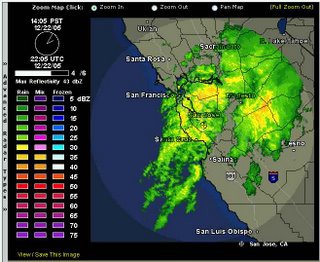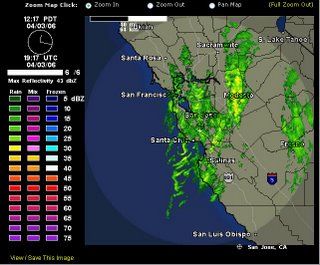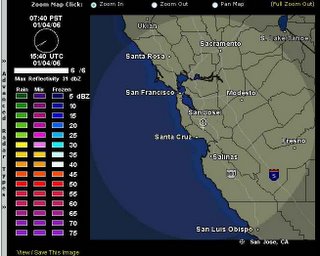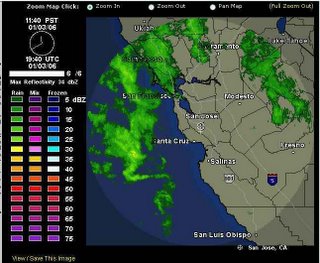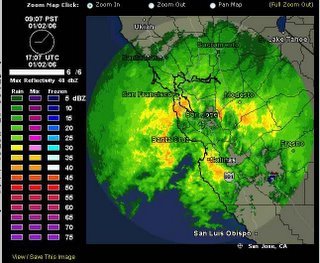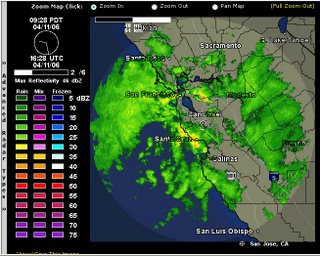
Tuesday, April 11, 2006
Monday, April 03, 2006
Tuesday, March 28, 2006
Thursday, January 19, 2006
 This house shown, Tuesday, Jan. 10, 2006, in Springfield, Ohio, is one of several in the city that have been stripped of aluminum siding and copper pipes by thieves looking to sell the scrap metal. Fueled in part by a building boom in China, demand for copper has pushed its price to historic highs, and aluminum prices are the highest they've been in 17 years.
This house shown, Tuesday, Jan. 10, 2006, in Springfield, Ohio, is one of several in the city that have been stripped of aluminum siding and copper pipes by thieves looking to sell the scrap metal. Fueled in part by a building boom in China, demand for copper has pushed its price to historic highs, and aluminum prices are the highest they've been in 17 years.First of all, someone stripped a house of its gutters and aluminum siding and no one noticed? WOW!
I think I need to hire a rent-a-cop and post him in my front yard.
Tuesday, January 17, 2006
Diagnostic criteria for 301.81 Narcissistic Personality Disorder
A pervasive pattern of grandiosity (in fantasy or behavior), need for admiration, and lack of empathy, beginning by early adulthood and present in a variety of contexts, as indicated by five (or more) of the following:
(1) has a grandiose sense of self-importance (e.g., exaggerates achievements and talents, expects to be recognized as superior without commensurate achievements)
(2) is preoccupied with fantasies of unlimited success, power, brilliance, beauty, or ideal love
(3) believes that he or she is "special" and unique and can only be understood by, or should associate with, other special or high-status people (or institutions)
(4) requires excessive admiration
(5) has a sense of entitlement, i.e., unreasonable expectations of especially favorable treatment or automatic compliance with his or her expectations
(6) is interpersonally exploitative, i.e., takes advantage of others to achieve his or her own ends
(7) lacks empathy: is unwilling to recognize or identify with the feelings and needs of others
(8) is often envious of others or believes that others are envious of him or her
(9) shows arrogant, haughty behaviors or attitudes
grandiosity
Inflated self-esteem or self-worth, usually manifested as content of thinking or talk with themes reflecting the patient's belief that he or she is the greatest or has special attributes or abilities.
Cautionary Statement
The specified diagnostic criteria for each mental disorder are offered as guidelines for making diagnoses, because it has been demonstrated that the use of such criteria enhances agreement among clinicians and investigators. The proper use of these criteria requires specialized clinical training that provides both a body of knowledge and clinical skills.
These diagnostic criteria and the DSM-IV Classification of mental disorders reflect a consensus of current formulations of evolving knowledge in our field. They do not encompass, however, all the conditions for which people may be treated or that may be appropriate topics for research efforts.
The purpose of DSM-IV is to provide clear descriptions of diagnostic categories in order to enable clinicians and investigators to diagnose, communicate about, study, and treat people with various mental disorders. It is to be understood that inclusion here, for clinical and research purposes, of a diagnostic category such as Pathological Gambling or Pedophilia does not imply that the condition meets legal or other nonmedical criteria for what constitutes mental disease, mental disorder, or mental disability. The clinical and scientific considerations involved in categorization of these conditions as mental disorders may not be wholly relevant to legal judgments, for example, that take into account such issues as individual responsibility, disability determination, and competency.
A pervasive pattern of grandiosity (in fantasy or behavior), need for admiration, and lack of empathy, beginning by early adulthood and present in a variety of contexts, as indicated by five (or more) of the following:
(1) has a grandiose sense of self-importance (e.g., exaggerates achievements and talents, expects to be recognized as superior without commensurate achievements)
(2) is preoccupied with fantasies of unlimited success, power, brilliance, beauty, or ideal love
(3) believes that he or she is "special" and unique and can only be understood by, or should associate with, other special or high-status people (or institutions)
(4) requires excessive admiration
(5) has a sense of entitlement, i.e., unreasonable expectations of especially favorable treatment or automatic compliance with his or her expectations
(6) is interpersonally exploitative, i.e., takes advantage of others to achieve his or her own ends
(7) lacks empathy: is unwilling to recognize or identify with the feelings and needs of others
(8) is often envious of others or believes that others are envious of him or her
(9) shows arrogant, haughty behaviors or attitudes
grandiosity
Inflated self-esteem or self-worth, usually manifested as content of thinking or talk with themes reflecting the patient's belief that he or she is the greatest or has special attributes or abilities.
Cautionary Statement
The specified diagnostic criteria for each mental disorder are offered as guidelines for making diagnoses, because it has been demonstrated that the use of such criteria enhances agreement among clinicians and investigators. The proper use of these criteria requires specialized clinical training that provides both a body of knowledge and clinical skills.
These diagnostic criteria and the DSM-IV Classification of mental disorders reflect a consensus of current formulations of evolving knowledge in our field. They do not encompass, however, all the conditions for which people may be treated or that may be appropriate topics for research efforts.
The purpose of DSM-IV is to provide clear descriptions of diagnostic categories in order to enable clinicians and investigators to diagnose, communicate about, study, and treat people with various mental disorders. It is to be understood that inclusion here, for clinical and research purposes, of a diagnostic category such as Pathological Gambling or Pedophilia does not imply that the condition meets legal or other nonmedical criteria for what constitutes mental disease, mental disorder, or mental disability. The clinical and scientific considerations involved in categorization of these conditions as mental disorders may not be wholly relevant to legal judgments, for example, that take into account such issues as individual responsibility, disability determination, and competency.
Wednesday, January 11, 2006

What is really healthy? What is good for your health? You think if a company lists something as being healthy it would be true. Especially raisins.
Well, here is an observation that I found kind of interesting. Take a 1.5 oz box of Sun-Maid Raisins (see photo). On the side it says "The Fast Fruit Snack". It also says "Eat 5 to 9 a day for better health." Now check the other side and observe the Calories listed on the nutrition facts. It says 130 calories. I know they are referring to 5 to 9 servings of fruits a day but it is really misleading and by the size of the container I would have a hard time believeing a person would not think it is one serving of fruit.
5 boxes is 650 calories.
9 boxes is 1170 calories.
5 boxes is about 1/3 of a normal adult calorie consumption. 9 boxes is over 1/2 the normal adult calorie consumption.
Raisins may have health benefits but I am sure they will be offset by being a fat ass because you just added 650 to 1170 calories to you daily diet.
Friday, January 06, 2006
Wednesday, January 04, 2006
First to the top of Calaveras!
Calaveras lunch time hill climb.
This is the first time I have ever been first to the top of a climb on a competitive ride. On top of being first, I beat the second place guy by one minute. I know this isn't a race but there were some pretty good climbers present.
Hopefully this is a preview of things to come. It definitely gives me the incentive to stay out of the refrigerator and keep training.
Calaveras lunch time hill climb.
This is the first time I have ever been first to the top of a climb on a competitive ride. On top of being first, I beat the second place guy by one minute. I know this isn't a race but there were some pretty good climbers present.
Hopefully this is a preview of things to come. It definitely gives me the incentive to stay out of the refrigerator and keep training.
Tuesday, January 03, 2006
Thursday, December 22, 2005
Today I rode in the rain. I just got back and took a snap shot of the weather radar from the web. http://www.wunderground.com
I am just north of the San Jose marker.
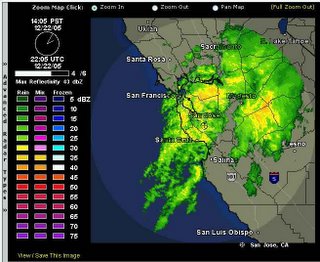
I am just north of the San Jose marker.

It is a fact that most people cannot estimate. Many times in my engineering classes I had people get outrageous answers for a test question that they simply boxed as the correct answer and went onto the next question. I received extra points several times by indicating to the teacher that this is the answer I got but I it cannot be correct. For example, 5000 degrees Fahrenheit just doesn't seem correct when you are determining the temp of a conventional oven.
What is my point? My point is that some people enter information, believing it is the truth, when it is absolutely outrageous. Here is an example and the reason for my ranting.
O.K. Let's do a little reality check here.
Log:
15 miles in 30 minutes
Sprints: 1, 45, 30, 15, 15, 30, 45, 1
Constants
1 hour = 60 minutes
Glossary
i = interval
r = recovery
mpm = miles per minute
mph = miles per hour
Basic Equations
mph = total miles / total hours
mpm = total miles / total mintues
mph = mpm * 60
miles = mph * hours = mpm * minutes
Assumptions:
1. The ride was broken into intervals and recovery.
2. Recovery was ridden at an average of 15 mph.
3. One set of intervals were ridden.
Scientific Investigation
Log: 15 miles in 30 minutes
mpm = total miles/total minutes = 15 / 30 = 0.5 mpm
mph = mpm * 60 = 0.5 * 60 = 30 mph
Intervals:
seconds minutes
60 ---- 1.00
45 ---- 0.75
30 ---- 0.50
15 ---- 0.25
15 ---- 0.25
30 ---- 0.50
45 ---- 0.75
60 ---- 1.00
300 --- 5.00 Totals
mpm = total miles / total minutes = (miles r + miles i)/ total minutes
miles = mpm * minutes
mpm = ((mpm r * minutes r) + (mpm i * minutes i)) / total minutes
mpm i = ((mpm * total minutes) – (mpm r * minutes r)) / minutes i
mpm i = ((.5 * 30) – (.25 * 25)) / 5
mpm i = 1.75
mph i = mpm i * 60 = 105 mph average for the intervals
I changes some of the assumptions and got the following values:
1. Changed recovery mph to 18 mph = 90 mph for the intervals
2. Changed intervals to 2 sets = 60 mph for the intervals
3. Combined 1 and 2 = 54 mph for the intervals
I don't know about you guys but I am spinning my 53-11 at about 150 rpm at 54 mph.
What is my point? My point is that some people enter information, believing it is the truth, when it is absolutely outrageous. Here is an example and the reason for my ranting.
O.K. Let's do a little reality check here.
Log:
15 miles in 30 minutes
Sprints: 1, 45, 30, 15, 15, 30, 45, 1
Constants
1 hour = 60 minutes
Glossary
i = interval
r = recovery
mpm = miles per minute
mph = miles per hour
Basic Equations
mph = total miles / total hours
mpm = total miles / total mintues
mph = mpm * 60
miles = mph * hours = mpm * minutes
Assumptions:
1. The ride was broken into intervals and recovery.
2. Recovery was ridden at an average of 15 mph.
3. One set of intervals were ridden.
Scientific Investigation
Log: 15 miles in 30 minutes
mpm = total miles/total minutes = 15 / 30 = 0.5 mpm
mph = mpm * 60 = 0.5 * 60 = 30 mph
Intervals:
seconds minutes
60 ---- 1.00
45 ---- 0.75
30 ---- 0.50
15 ---- 0.25
15 ---- 0.25
30 ---- 0.50
45 ---- 0.75
60 ---- 1.00
300 --- 5.00 Totals
mpm = total miles / total minutes = (miles r + miles i)/ total minutes
miles = mpm * minutes
mpm = ((mpm r * minutes r) + (mpm i * minutes i)) / total minutes
mpm i = ((mpm * total minutes) – (mpm r * minutes r)) / minutes i
mpm i = ((.5 * 30) – (.25 * 25)) / 5
mpm i = 1.75
mph i = mpm i * 60 = 105 mph average for the intervals
I changes some of the assumptions and got the following values:
1. Changed recovery mph to 18 mph = 90 mph for the intervals
2. Changed intervals to 2 sets = 60 mph for the intervals
3. Combined 1 and 2 = 54 mph for the intervals
I don't know about you guys but I am spinning my 53-11 at about 150 rpm at 54 mph.
Tuesday, December 20, 2005

Last weekend Kalen Gruber and I rode an epic mountain bike ride up to Mt. Umunhum. Our route was the Los Gatos Creek Trail, Priest Rock Trail, Upper Limklin Trail, Woods Trail, Barlow Road, Mt. Umunhum road and back to Los Gatos via Hicks Road. As you can see from the photo it was a very senic route.


Thursday, December 15, 2005
December 15, 2005
The weather here in California has been incredible for training. Little rain and when it did rain it was only for one day. We do need the rain but when it's wet I hit the trails with my mountain bike. Anyway, I have been training hard and it is time for a break. My legs are tired and I am a little mentally blown. Here are some screen prints from my training log database that is up to date as of today.
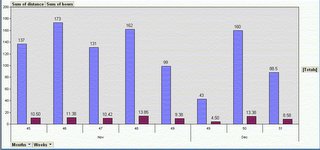
Miles Per Week Graph
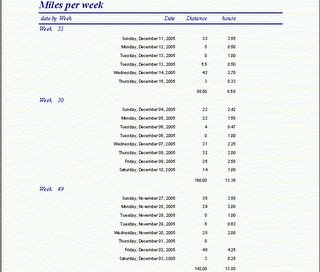
Miles Per Week list
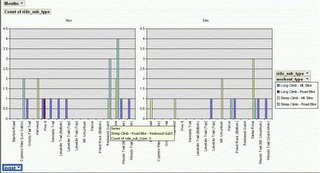
Hill Climb Graph

Lifting Graph
The weather here in California has been incredible for training. Little rain and when it did rain it was only for one day. We do need the rain but when it's wet I hit the trails with my mountain bike. Anyway, I have been training hard and it is time for a break. My legs are tired and I am a little mentally blown. Here are some screen prints from my training log database that is up to date as of today.

Miles Per Week Graph

Miles Per Week list

Hill Climb Graph

Lifting Graph
Subscribe to:
Posts (Atom)
